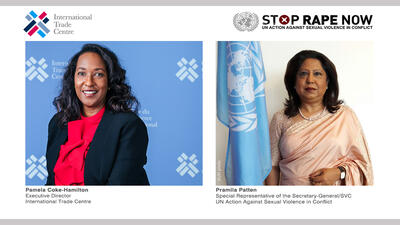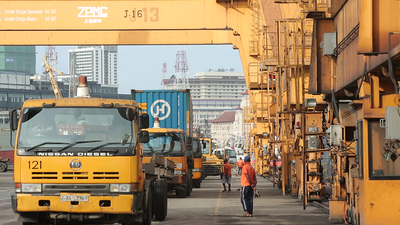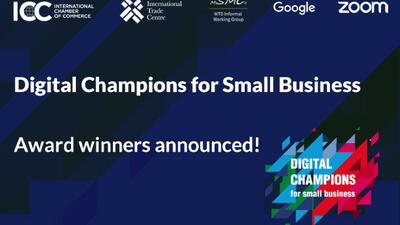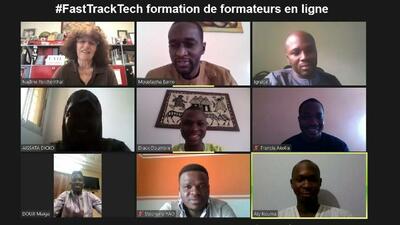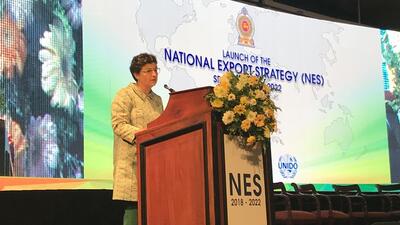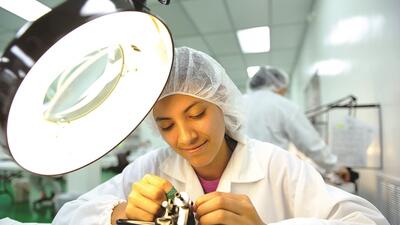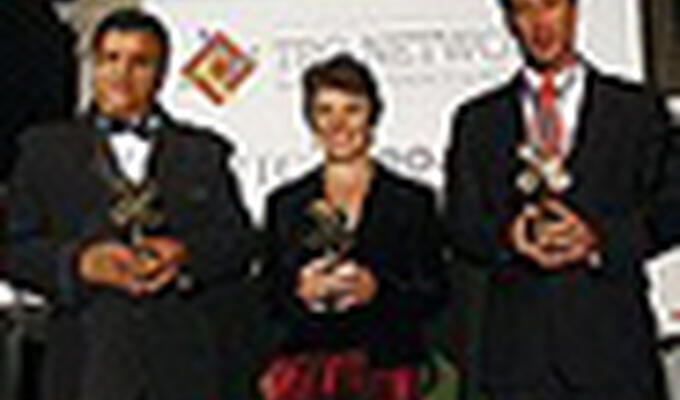


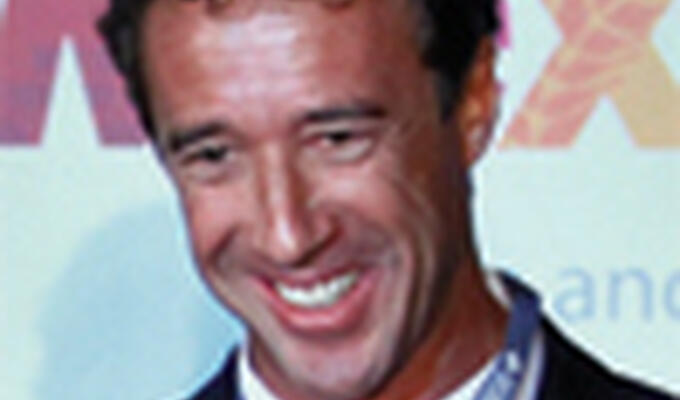
TPO Awards: Excellence in trade
The 2010 TPO Network Awards recognized excellence in export development initiatives by trade promotion and support organizations to boost export performance.
Sponsored by the International Trade Centre (ITC), the biennial TPO Network Awards aim to support small and medium-sized enterprises (SMEs), particularly in developing countries, to become more competitive in global markets. In accordance with the ITC’s Export Impact for Good mandate, the Awards support the ITC’s objectives to strengthen the international competitiveness of enterprises and develop the capacity of trade service providers to support businesses in integrating into the global economy.
In presenting the award winners, ITC Executive Director and Chair of the adjudicating panel, Patricia Francis, highlighted the vital contribution that strong, well-equipped and agile TPOs (trade promotion organizations) make to economic growth and development.
‘These awards recognize TPOs that understand where the opportunities are and think about innovative ways to motivate companies to go after export markets,’ said Ms Francis. ‘Success today also depends on understanding the nuances of supply chains and how you can fit into a global supply chain. Business is no longer focused solely on end-to-end production – it’s about being part of a whole. Globalization is creating more opportunities to do this.
‘These winners are tackling the growing challenges of today’s increasingly competitive marketplace and the effects of the global economic recession. They are delivering real value to their customers.’
Winners of the Small Island Developing State category, Enterprise Mauritius took an integrated approach to address both the needs of clients and the market. ‘The proximity of markets is a problem, so we have to leverage our every strength. We focused on SMEs to help them maximize their internal capacities,’ said Prakash Beeharry, CEO of Enterprise Mauritius.
‘For us, success depends on a continuous learning process, based on listening, being part of the process and understanding what we have to improve in our service delivery,’ said Mauricio Borges, Director of ApexBrasil, which won the Best Developing Country category award.
In the Developed Country category, UKTI’s Deputy Chief Executive Susan Haird said that her organization undertook case studies and focused on projects that were measurable and that they were proud of. ‘We worked with selected companies over a period of two to 10 years, giving them in-depth assistance which included looking at new export markets. We certainly learned a lot about best practice from other TPOs.’
Like past award winners, the 2010 recipients will be able to use the recognition to focus attention on the value of TPO services and assist governments in achieving their economic goals through showcasing the value of developing and funding export promotion programmes. The 2012 TPO Network Awards will be held in Kuala Lumpur, Malaysia in conjunction with the 9th TPO Network Conference.
THE WINNERS
Mauritius
Best Trade Promotion Organization from a Small Island Developing State
(Enterprise Mauritius)
Brazil
Best Trade Promotion Organization from a Developing Country
(Brazilian Trade & Investment Promotion Agency – Apex-Brasil)
United Kingdom
Best Trade Promotion Organization from a Developed Country
(UK Trade & Investment – UKTI)
THE RUNNERS-UP
from a developing country
Armenia
(Armenian Development Agency – ADA)
from a developed country
Hungary
(Hungarian Investment and Trade Promotion Agency – ITD Hungary)
SPECIAL MENTIONS
from a developing country
Malaysia
(Malaysia External Trade Development Corporation – MATRADE)
from a developed country
Australia
(Australian Trade Commission – Austrade)
2010 TPO NETWORK AWARDS WINNERS
The winners of the 2010 TPO Network Awards demonstrated outstanding performance in the use of innovative and efficient processes and systems in their export development initiatives. On behalf of International Trade Forum, Dianna Rienstra questioned the winners about their experiences including the challenges and opportunities they faced during the global economic crisis.
Q&A
WINNER – DEVELOPED COUNTRY
Susan Haird, Deputy Chief Executive, UK Trade & Investment (UKTI)
TF:What challenges did UKTI face before you made the changes that led to your winning this award?
SH: The main difficulty was to meet the needs of companies with some export experience that were ready to grow their export business. We were good at dealing with experienced exporters that did not need intensive relationship management. The gap was with companies with little experience that wanted to expand into more complex markets, such as China and India, where they faced issues such as cultural challenges and intellectual property rights (IPR) obstacles to name a few.
TF: How did you identify what changes to make?
SH: We identified this gap in the market through evaluation. We implemented a system for in-depth account management for a group of new customers over a period of 18 months, through which we identified needs and markets that might be most appropriate. We signposted this to our services overseas, but also turned to private sector advisers in the UK to get advice, for example, on issues such as IPR.
TF:What challenges did UKTI face when implementing these changes?
SH: Once we had identified potential customers, we then put together a package that enabled new customers to access services. These services had to be relevant to the private sector and designed to help our clients increase their capacity to export into new and challenging markets.
TF:What results have you achieved to date?
SH: Last year we supported 25,000 companies and created £5 billion of additional profits for our customers and £35 billion of additional exports. That result represents a ratio of £19 to every £1 the UK spends on trade promotion. We use external contractors to measure our impact in a rigorous way. We interview 15% of our clients six to eight months after we deliver services and we return to a smaller number of clients one year later. Consultants ask targeted questions in a 20-minute interview focusing on the quality and satisfaction levels of the services offered. We specifically aim to find out if we helped them, gave them access to contacts, built their reputation and changed their business processes. We also ask what more research and development they undertook, what additional profit they expect to make and whether we helped to increase competiveness.
Our Gateway to Global Growth (G3) programme targeted innovative companies with two to 10 years of export experience that needed a new approach to export support which recognized the changes in the international business environment. G3 offers a trajectory of guidance and support services designed to take these companies to a higher level of international success. Evaluation showed that 1,200 SMEs participated in the first 12 months. Of those, 67% improved their business performance and 80% increased productivity and competitiveness. Quality and satisfaction ratings for G3 are 88% and 81% respectively.
TF:What are the most innovative changes you have implemented?
SH: Implementing in-depth account management for a new group of customers and drawing on the private sector to support these customers was innovative for UKTI.
TF:What are the major obstacles faced by TPOs in demonstrating value for money to stakeholders including both clients and governments, at local and national levels?
SH: There are many. For one, every government is demanding that TPOs show value for money. In the US and Europe, growth rates are low and the pace of global demand is also slow. The big opportunities are in the emerging markets, but the difficulties faced by companies and TPOs are larger than in other markets. For example, market access barriers can work against setting up a business. To be competitive when global demand is restrained by the recession is a huge challenge. TPOs must promote growing markets, which will help to demonstrate value for money. They must also measure what they do.
TF:Is your model replicable by other TPOs?
SH: Yes, absolutely. We’d be happy to make our evaluation model available to any interested TPO.
Q&A
WINNER – SMALL ISLAND DEVELOPING STATE ENTERPRISE
Prakash Beeharry, CEO, Enterprise Mauritius
This is Enterprise Mauritius’ second TPO Network Award. In 2006, it was recognized for an integrated approach that allowed it to focus on the internal capability of Mauritian businesses and international market opportunities simultaneously rather than sequentially. This allowed Enterprise Mauritius to respond to change more rapidly and help more of the country’s companies to shift from a local market orientation to an emphasis on exporting. This year, Enterprise Mauritius was awarded for the innovative approach it took to determine client needs and facilitate the right programmes to service them through implementing its 3C’s concept.
TF:This award recognizes the changes your TPO made in order to offer an integrated approach. What challenges did you face before you made these changes?
PB: Changing times meant a reconsideration of the TPO landscape and Enterprise Mauritius realized we had to re-engineer ourselves from a trade support institution (TSI) and TPO to a fully-fledged trade development organization (TDO). Previously, TPOs were geared towards providing information to bridge the knowledge gap between suppliers and buyers. They had more involvement with supply chain variables but the evolution of the international commercial environment brought complex and interlinked challenges that required a paradigm shift. This is why we revised our concept to TPO+TSI=TDO.
Enterprise Mauritius has historically handled projects across different areas of enterprise and market development. Overseeing a vast number of widely diverse projects, coupled with a process that expected each member of the technical team to be responsible for a portfolio of cross-divisional assignments, made it cumbersome to monitor, evaluate and report. Our ‘multi-highway’ mode required a new structured approach aimed at proper filtering and measurement processes to evaluate our success. This required the development of a model that was flexible enough to include all projects within our scope and to equip the organization to follow each individual project and make spot reports on all projects at any point in time.
TF:How did you identify what changes to make?
PB: We reviewed industrial structures and identified the difficulties faced by each of our industry sectors worldwide. Industries vary, usually with SMEs outnumbering larger companies, but their market focus is also different. This ‘reality check’ suggested that companies’ needs are similar. However, the proportion of each subsectoral need within the universal set of needs is directly proportionate to the weight of that subsector in the national economy.
As a result, we based our new model on the 3C’s concept:
• Competitiveness enhancement – focusing on diffusing technology, developing enterprises, providing working capital and sourcing clean energy
• Market connectivity – support for upgrading product quality, standards and packaging
• Product conformity – surveys of markets with export potential, business meetings, international trade fairs and financial assistance to companies exploring foreign markets.
TF:What results have you achieved to date?
PB: The functionality and user friendliness of the model have inculcated a new culture and officers have a much stronger grip on project implementation. Engagement of potential beneficiaries, clear demarcations of the role of stakeholders, optimization of resources and impact are assured. Measurability of both quantitative and qualitative performance indicators is achieved on a step-by-step basis.
We tested the 3C’s model in three case studies. The new market development for SMEs in the Swedish market project supported Mauritian SME clothing manufacturers in developing export opportunities. Between 2006 and 2009, exports of clothing to Sweden grew from less than 2 million rupees to nearly 10 million rupees. Another SME project sought to help Mauritian agro-processing and textile companies penetrate the US market. Between 2008 and 2009, exports by large enterprises increased 21%, while SMEs, without prior US export experience, realized 69% growth.
Enterprise Mauritius also created an action plan to inform and prepare SMEs to meet new European Union (EU) product regulations, which resulted in the European Commission commending us and provided funding. In 2008, no Mauritian SMEs were exporting to the EU. By June 2009, three SMEs were regularly exporting processed food to France with a value of nearly 5 million rupees.
TF:What is the most innovative change you have made?
PB: This model has the capacity to provide a structured approach that enables the identification of needs and assists in the clear formulation and efficient implementation of support programmes that optimize TPO performance and maximize the impact to beneficiaries. We also established a public–private partnership involving the chamber of commerce, industry associations, ministries and public institutions.
TF:In your view, what are the major obstacles TPOs face in demonstrating value for money to stakeholders – both clients and public authorities?
PB: The major challenges TPOs face today stem from the fact that their roles have become increasingly diverse and extensive. The input–output equation is not so direct because the initiatives in developing countries revolve more around issues related to graduation and export readiness of enterprises. Subsequently, the efficacy of TPO interventions, the efficiency of resource allocation and measurement of impact are rendered complex, blurred and debatable.
TF:Is your model replicable by other TPOs?
PB: The 3C’s model has proven to be ‘SMARTER’ (simple, measurable, actionable, realistic, timeliness, evaluate and re-evaluate) and should be an effective mechanism for all TDOs committed to efficient service delivery. The model is an ‘all-in-one’ formula for TDO applications, best practices and benchmarking. The model is unique in that it is scientific in approach, orderly in concept and understanding, exhaustive in capturing industry needs, clear in methodology, efficient in resource planning, comprehensive in solution generation and effective in result orientation.
Q&A
WINNER – DEVELOPING COUNTRY
Mauricio Borges, Business Director, Apex-Brasil
TF:What challenges did your organization face before you made the changes in processes that led to your winning the award?
MB: In 2007, Apex-Brasil implemented a significant restructuring process aimed at keeping up with changes in the economic environment, including government policies to open markets and respond to Brazil’s fast growing economy and consumer market. Brazilian companies faced increasing competition abroad and at home and, for many, going global was the only option to survive. We found different levels of preparedness in dealing with the new economic reality. Some companies were interested in taking part in Apex-Brasil’s trade promotion projects, but they were not ready to become exporters. They needed capacity building and coaching, while other mature Brazilian companies needed more sophisticated services. As a result of these external changes and new demands, Apex-Brasil expanded its range of services and offered a new integrated approach so that companies could receive assistance according to their level of preparedness.
TF:How did you identify the changes you had to make?
MB: The Brazilian Government and Apex-Brasil implemented studies and consulted counterparts in the private sector to identify the necessary changes. One of the main changes we made was to implement PEIEX (Industrial extension for exporting project), an export capacity-building programme to supplement trade promotion and internationalization initiatives already on offer and enable companies to benefit from a range of integrated, export-support services. PEIEX was crucial. It had a significant impact on companies’ competitiveness through preparing them to face challenges in both domestic and international markets.
TF: What challenges did Apex-Brasil face when implementing the changes?
MB: There were several: maintaining the integrated approach to the portfolio of Apex-Brasil services, identifying target SMEs and coordinating with external partners, especially universities.
We also had to modify our client approach with services provided directly to companies instead of industrial and services associations.
We had direct interaction with Brazilian companies, not only through PEIEX, but through other services and distribution channels such as our
regional offices, website and customer relationship management system.
PEIEX still faces problems such as maintaining its cost efficiency while making the programme available across the country, given the differences in economic and social development of the Brazilian states involved. PEIEX also requires constant updates in terms of methodology and project team training to guarantee high standards of coaching, consulting and business management.
TF: What changes and results have you achieved to date?
MB: Between 2006 and 2010, Apex-Brasil achieved growth in:
• The number of events – from 394 in 2006 to 842 in 2009, and more than 900 events by the end of 2010;
• The number of companies assisted – from 4,699 to 12,783;
• The share of assisted companies in total exports – from 6.5% to 22.98%; and
• The number of industrial and services sectors served – from 52 to 80.
Aside from registering quantitative results, we monitor and measure the impact of our activities through a sophisticated project management system used across Apex-Brasil and all partners involved in supported projects which enables us to assess the output and results of the initiatives.
Our peers also recognized Apex-Brasil’s excellence by electing our President, Alessandro Teixeira, President of the World Association of Investment Promotion Agencies in 2008 and 2010. He was also elected President of the Ibero-American Network of Trade Promotion Organizations in 2009.
TF: What are the most innovative changes you have implemented?
MB: We consolidated an integrated strategy to foster the internationalization of Brazilian companies. The well-designed system included numerous integrated initiatives related to information, export qualification, export promotion, image promotion and internationalization support which allowed companies from various sectors and of different sizes and levels of business development to receive appropriate services.
TF: In your view, what are the major obstacles TPOs face in demonstrating value for money to stakeholders including clients and public authorities?
MB: As in any other country, in Brazil there are different governmental bodies and organizations involved in trade promotion, image promotion and SME export capacity building. All of these players need to avoid replicated actions in order to use public money rationally. In this sense, developing a common strategy and distributing roles efficiently between organizations are crucial. For us, the most important factor in reinforcing value for money was changing the strategy-building process. Since 2007 we have identified priority markets, sectors and activities based on business intelligence gathered from research, analysis, statistical data and market trends together with the characteristics of the potential sectors and the clients’ market knowledge and experience.
TF:Is your model replicable by other TPOs?
MB: Many innovative features in our model are used and benchmarked by other TPOs. We receive technical visits and provide services under technical cooperation agreements with partner TPOs, keen to replicate Apex-Brasil’s best practices. Those practices include:
• An integrated approach to the services portfolio;
• Project management and results monitoring system;
• Strategic decision-making process based on business intelligence;
• Client relations management;
• Strategic partnerships approach; and
• Benchmarking.






